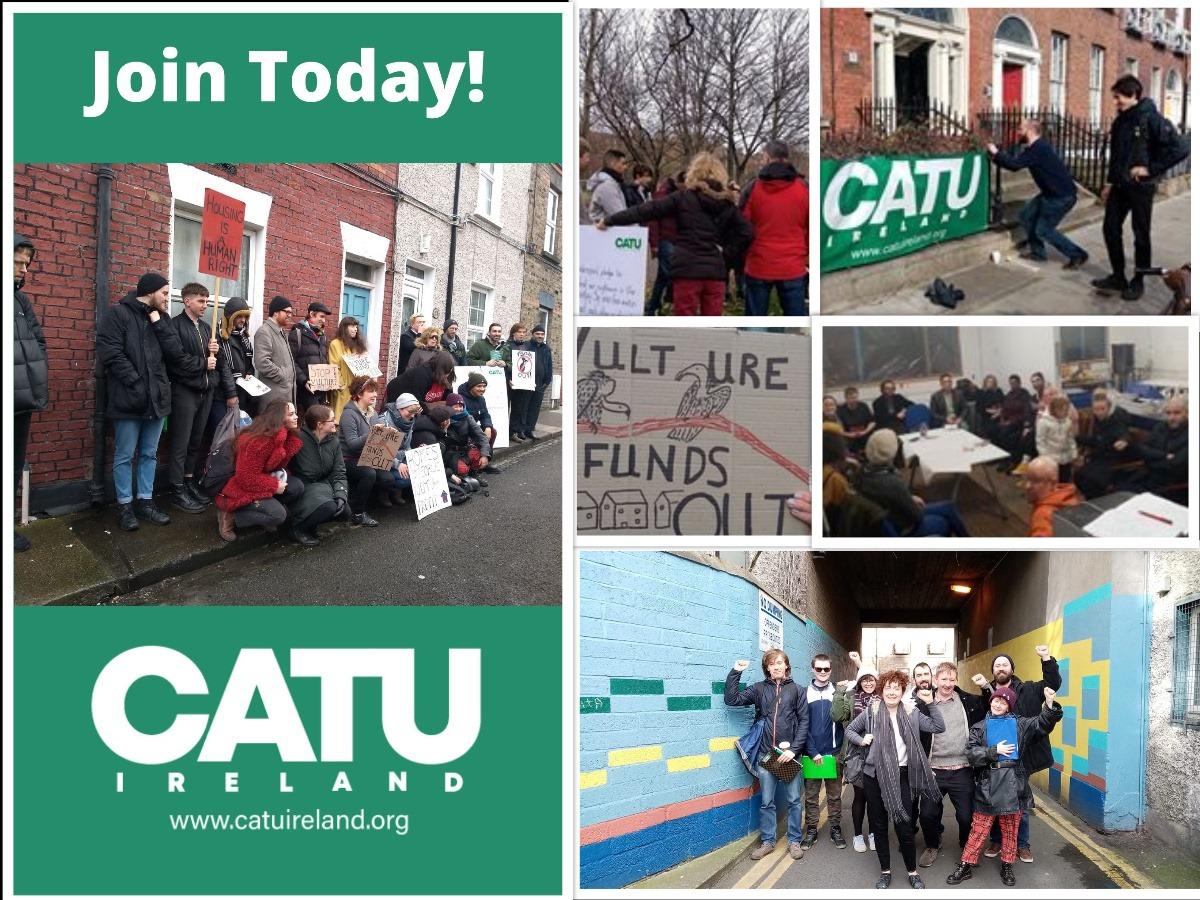
The Community Action Tenants' Union (CATU) Ireland is a dynamic, grassroots, and member-led organization that has rapidly emerged as a powerful force in the struggle for housing rights and community empowerment across the island of Ireland. Founded in Dublin in October 2019, CATU was born out of a collective recognition by seasoned housing activists that a more sustained, community-based, and unionized approach was needed to tackle Ireland's escalating housing crisis and the erosion of public services and spaces.
The foundational idea of CATU is remarkably simple yet revolutionary: to take the core principles of trade unionism – membership, collective direct action, and grassroots democracy – and apply them to people's lives outside of their workplaces. This means uniting individuals not based on their profession, but on their shared experience of living in communities and grappling with housing insecurity. CATU's membership is intentionally broad and inclusive, encompassing:
This inclusive membership model allows CATU to address a wide spectrum of housing-related issues, from individual tenancy disputes to broader systemic challenges affecting entire communities.
Many of CATU's founding members brought a decade of experience in housing activism, having participated in significant protests and campaigns such as the Apollo House occupation, Home Sweet Home, Take Back The City, and Right2Water. They drew inspiration not only from these impactful local movements but also from successful tenant and trade union movements across Britain and Europe, particularly the Scottish tenants' union Living Rent, and the historical legacy of the 1960s Dublin Housing Action Committee and the National Association of Tenants Organisations (NATO), which famously led a national rent strike in the early 1970s. This rich lineage underscores CATU's commitment to sustained, organized struggle rather than sporadic protest.
CATU's vision is to build a powerful, deeply rooted organization across cities and towns throughout the entire island of Ireland, uniting tenants and communities in a coordinated struggle on common issues. They firmly believe that real power lies in the collective hands of ordinary people, and that meaningful change can only come when they act together. They explicitly state:
"We think that the only way to beat those behind this – the landlords, banks, companies and politicians – is to get organised ourselves, and NOT just on an individual basis."
CATU's operations are guided by a set of clear principles that prioritize collective power and democratic action:
Membership-Based and Member-Led: CATU is owned and primarily funded by its members through monthly dues, typically ranging from €5 to €20, with an average of just over €8 per member. Membership is free for asylum seekers and those in Direct Provision, ensuring accessibility for the most vulnerable. This financial independence is crucial, as it means the union is not reliant on government or corporate funding, which they are often fighting against. Members have an equal vote and are directly involved in decision-making and campaigning.
Collective Direct Action: Instead of individual pleading, CATU promotes collective direct action. This involves organized, public-facing actions designed to apply pressure on landlords, councils, banks, and politicians to meet specific, winnable demands. This can include:
Grassroots Democracy: Decisions within CATU are made democratically at the local and national levels. Local groups (15-20 members) can launch, elect committees, and decide on initial campaigns. When a local group reaches 40 members, it can become a formal branch, electing a local committee and a national representative. This decentralized, yet coordinated, structure ensures that campaigns are rooted in the specific needs and concerns of local communities while benefiting from broader union solidarity.
Organizing, Not Just Advocacy or Service Provision: CATU explicitly states it is not a service provider, a charity, or an advocacy group that speaks for the oppressed. Instead, it provides the training, tools, and organizational structure to empower affected individuals to fight back with their community beside them. This fundamental distinction means that every member is encouraged to be actively involved in the struggle, avoiding power dynamics that can disempower marginalized groups.
Building Power Through Wins: CATU believes that winning concrete, achievable campaigns demonstrates the power of collective action. Each win, whether it's getting a repair done, resisting an eviction, or securing a community amenity, builds confidence among members and raises expectations for what can be achieved through organized effort. These wins are often publicized (with consent) to inspire others and showcase the union's effectiveness.
Key Campaign Areas and Achievements:
CATU tackles the economic issues plaguing ordinary people across Ireland, including sky-rocketing rents, precarious housing, and the erosion of public spaces. Their campaigns are varied and impact daily lives:
In a short period since its founding, CATU has witnessed remarkable growth, expanding from a few dozen founders to approximately 1,750 members by late 2022, with over 20 formally established branches and numerous local groups building towards official launches across Ireland's 32 counties. This growth underscores the urgent need for such an organization and its effectiveness in mobilizing people around shared concerns.
CATU Ireland represents a powerful, democratic, and increasingly influential response to Ireland's profound housing crisis. By empowering ordinary people to organize, take collective action, and demand their rights, it is actively building a movement dedicated to securing safe, secure, and affordable homes for all, transforming individual struggles into a collective fight for social and economic justice.